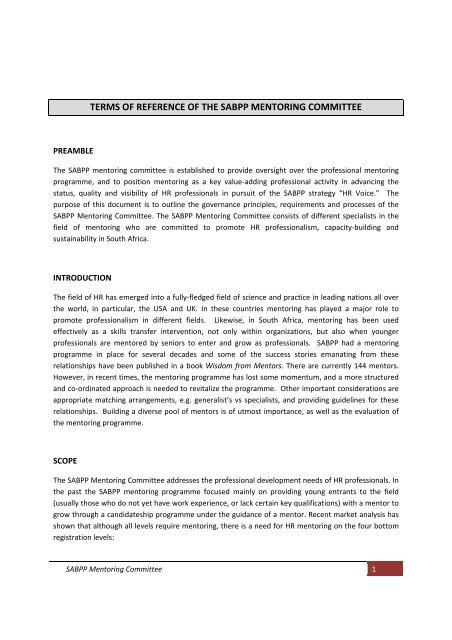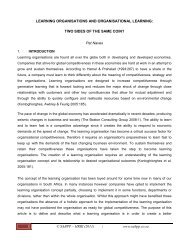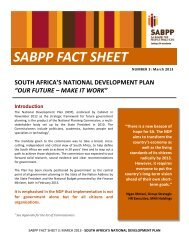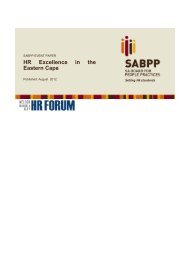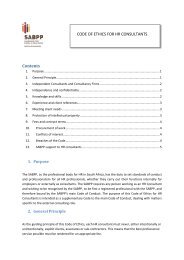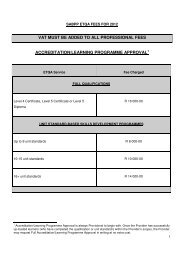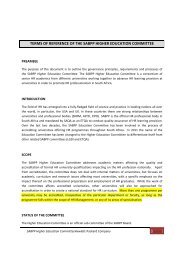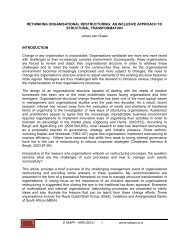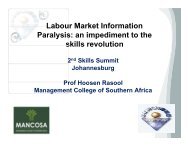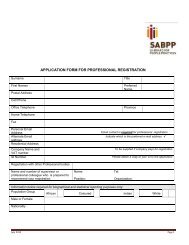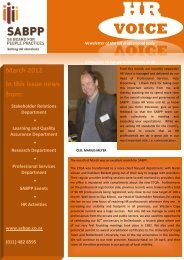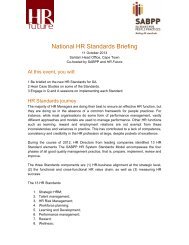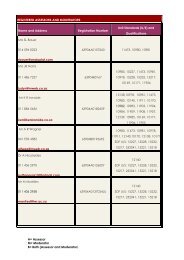TERMS OF REFERENCE OF THE SABPP MENTORING COMMITTEE
TERMS OF REFERENCE OF THE SABPP MENTORING COMMITTEE
TERMS OF REFERENCE OF THE SABPP MENTORING COMMITTEE
You also want an ePaper? Increase the reach of your titles
YUMPU automatically turns print PDFs into web optimized ePapers that Google loves.
<strong>TERMS</strong> <strong>OF</strong> <strong>REFERENCE</strong> <strong>OF</strong> <strong>THE</strong> <strong>SABPP</strong> <strong>MENTORING</strong> <strong>COMMITTEE</strong>PREAMBLEThe <strong>SABPP</strong> mentoring committee is established to provide oversight over the professional mentoringprogramme, and to position mentoring as a key value‐adding professional activity in advancing thestatus, quality and visibility of HR professionals in pursuit of the <strong>SABPP</strong> strategy “HR Voice.” Thepurpose of this document is to outline the governance principles, requirements and processes of the<strong>SABPP</strong> Mentoring Committee. The <strong>SABPP</strong> Mentoring Committee consists of different specialists in thefield of mentoring who are committed to promote HR professionalism, capacity‐building andsustainability in South Africa.INTRODUCTIONThe field of HR has emerged into a fully‐fledged field of science and practice in leading nations all overthe world, in particular, the USA and UK. In these countries mentoring has played a major role topromote professionalism in different fields. Likewise, in South Africa, mentoring has been usedeffectively as a skills transfer intervention, not only within organizations, but also when youngerprofessionals are mentored by seniors to enter and grow as professionals. <strong>SABPP</strong> had a mentoringprogramme in place for several decades and some of the success stories emanating from theserelationships have been published in a book Wisdom from Mentors. There are currently 144 mentors.However, in recent times, the mentoring programme has lost some momentum, and a more structuredand co‐ordinated approach is needed to revitalize the programme. Other important considerations areappropriate matching arrangements, e.g. generalist’s vs specialists, and providing guidelines for theserelationships. Building a diverse pool of mentors is of utmost importance, as well as the evaluation ofthe mentoring programme.SCOPEThe <strong>SABPP</strong> Mentoring Committee addresses the professional development needs of HR professionals. Inthe past the <strong>SABPP</strong> mentoring programme focused mainly on providing young entrants to the field(usually those who do not yet have work experience, or lack certain key qualifications) with a mentor togrow through a candidateship programme under the guidance of a mentor. Recent market analysis hasshown that although all levels require mentoring, there is a need for HR mentoring on the four bottomregistration levels:<strong>SABPP</strong> Mentoring Committee 1
HR CandidateHR TechnicianHR AssociateHR PractitionersThe focus of the <strong>SABPP</strong> mentoring programme is to advance the HR profession by ensuring adequateskills transfer from seniors to juniors. Clear templates need to be provided for a consistent andstandardised approach to mentoring, not only to govern the success of these relationships, but also toprovide a consistent framework for record‐keeping and consolidation of data for report back to theboard. In addition, the committee may also oversee a process of capacity‐building of mentors to ensurethat all mentors provide a consistent quality of mentoring in meeting HR professional standards. Inparticular, guidelines are needed regarding objectives, the frequency of meetings, reporting periods andthe nature of these interactions. Furthermore, a mentee‐driven approach may be followed, therebyensuring that the mentee takes full responsibility for the success of mentoring. A balance needs to befound between flexibility and structure/standards. Two broad types of mentoring are discerned:Candidateship – for assisting a junior HR person to enter into the profession;Growth – current professionals who want to advance to a higher level of registration.STATUS <strong>OF</strong> <strong>THE</strong> <strong>COMMITTEE</strong>The Mentoring Committee is an official sub‐committee of the <strong>SABPP</strong> Board. The committee may alsoliaise with the professional registration committee to ensure alignment with HR professional standards.Moreover, other aspects of professionalism, e.g. ethics should be infused into the mentoringprogramme and this may require liaison with the ethics committee.PRINCIPLESThe following principles guide the Mentoring Committee:Sound relationships between mentors and mentees are critical for growing and sustaining HRprofessionalism in South Africa.The mentoring programme must be well functioning with an appropriate infrastructure to makeit work effectively.The highest quality of learning provision and research is needed to ensure adequate skillstransfer between senior and junior HR professionals.HR knowledge and wisdom must be transferred to the HR professional community todemonstrate professionalism as role‐models and to improve practice.<strong>SABPP</strong> will set professional standards and guidelines for mentoring.<strong>SABPP</strong> Mentoring Committee 2
A greater sharing of information and resources between senior and junior practitioners willenhance the HR profession in South Africa.A mentee‐driven approach will ensure ownership and optimise learning and growth.The role of the mentor is to support the mentee in specific professional growth areas asidentified for each mentee.An appropriate balance needs to be found between flexibility and governance (formal).The mentoring relationship can be valuable to instill ethics and a duty to society into themindset of mentees (all four pillars of professionalism).Measurement of the mentoring programme should be at the level of uptake as well as theimpact on the profession.While mentoring relationships are private and confidential, communication, engagement andpublicity should be encouraged when success stories emerge, also with alliance partners.FUNCTIONS AND RESPONSIBILITIES <strong>OF</strong> <strong>THE</strong> <strong>COMMITTEE</strong>The remit of the committee is to address the following mentoring needs in the HR profession:Creating awareness of the value of mentoring to enhance professionalismWork‐integrated learning and meeting the needs of the HR professional marketHR thought leadershipSetting criteria for mentors and menteesExpanding the pool of mentors and menteesHR student empowerment and employmentHR professionalism of entry and middle‐level HR professionalsBuilding capacity in ethical decision‐making and resolution of ethical dilemmasSkills and knowledge transferLearning about HR issues and dynamics in particular industriesEnsuring appropriate matching and that both mentors and mentees learn in the processDeveloping mentoring skills among mentorsUsing orientation programmes to understand what is expected in terms of roles andresponsibilitiesProviding clear guidelines and setting boundaries in terms of availability, ethics and otherimportant aspects of the relationshipOptimising the use of alternative mentoring methods, e.g. group mentoringCOMPOSITION <strong>OF</strong> <strong>THE</strong> <strong>COMMITTEE</strong>The composition of the committee is as follows:<strong>SABPP</strong> Mentoring Committee 3
Mentors representing the corporate environment, consultants, academics and other interestedparties may join the committee.The mentoring committee will meet at least three times a year, or at more regular intervalswhen required.A Chairperson and Vice‐chairperson will be elected on an annual basis. Additional members, orsub‐committee members may be co‐opted when required.A representative of the <strong>SABPP</strong> professional services department will be available to attendmentoring committee meetings and to assist with the process of driving, co‐ordinating andadministering the mentoring programme.ROLES AND RESPONSIBILITIESThe following roles and responsibilities need to be fulfilled:A Chairperson is elected on an annual basis to oversee the work of the committee. The chair ofthe committee will prepare an annual report outlining the work of the committee to be includedin the <strong>SABPP</strong> Integrated Report.A Vice‐chair is elected annually to assist the chair and to oversee specific committee projects.The CEO will keep the mentoring committee informed of important <strong>SABPP</strong> strategic initiativesaffecting the mentoring programme. The CEO will drive the execution of decisions taken andprovide feedback to the <strong>SABPP</strong> Board about the work of the committee. The CEO is responsiblefor ensuring alignment with the <strong>SABPP</strong> Charter and Strategy.The <strong>SABPP</strong> Executive Administration Assistant will perform secretarial duties. The secretary willcompile the agenda on behalf of the chairperson; notify all members of the meeting date, timeand venue; request agenda items a month before the meeting; send the agenda to all membersat least seven days in advance of the meeting to all members; keep the minutes of all meetings;send minutes to all members within a week after the meeting; keep record of all documentationin a manual and electronic mentoring file.The Head of Professional Services will be responsible for implementing the decisions of thecommittee and drive the daily execution of mentoring programme deliverables.Any member of the committee (or additional members) may be co‐opted or delegated to workon specific projects approved by the committee.DECISION‐MAKINGDecisions are made according to the following governance mechanisms:A quorum of four members must be present for decision‐making at the meeting.For daily matters, the Chair, Vice‐chair and CEO constitute the Executive Committee of thementoring committee, supported by the Head of Professional Services.<strong>SABPP</strong> Mentoring Committee 4
For matters impacting on the overall strategy of <strong>SABPP</strong>, the <strong>SABPP</strong> Board Exco consisting of the<strong>SABPP</strong> Chair and Vice‐chair together the CEO will make the relevant decisions.GOVERNANCE REQUIREMENTSThe following governance requirements will be met by the committee:Ensuring that the needs of the HR professional community are embedded in mentoringprogrammes.Adherence to the <strong>SABPP</strong> Ethical Code and mentoring guidelines.Proper governance, record‐keeping and follow‐up in terms of minutes, proposals and reports.Monitoring of the programme and reporting back to the Board.PROCESS <strong>OF</strong> GOVERNING <strong>MENTORING</strong> RELATIONSHIPSThe following generic process will be followed in the event of mentoring:1. Mentors register with <strong>SABPP</strong> as professional mentors.2. Mentees register their need for mentoring (all candidate practitioners will be registeredautomatically).3. <strong>SABPP</strong> will provide criteria and guidelines for the <strong>SABPP</strong> mentoring programme.4. Mentoring relationships are formed when mentors and mentees are matched.5. The parties complete a mentoring agreement with clear deliverables.6. The mentoring progress report is completed.7. A close‐out report is completed and submitted to the Head of Professional Services.REPORTINGThe following reporting channels are in place:Task teams will report back to the Chair and Vice‐chair on the execution of decisions taken, or tothe CEO when required.The Committee chair will report to the Chairperson of the <strong>SABPP</strong> Board.Daily reporting is done to the Head of Professional Services.Forms are administered by the Professional Registration Officer.MONITORINGThe chair will monitor the progress of the committee in terms of the achievements of deliverables. Amentoring scorecard will be developed to track progress and to consolidate a national picture of HRmentoring results.<strong>SABPP</strong> Mentoring Committee 5
<strong>SABPP</strong> Mentoring Committee 6


